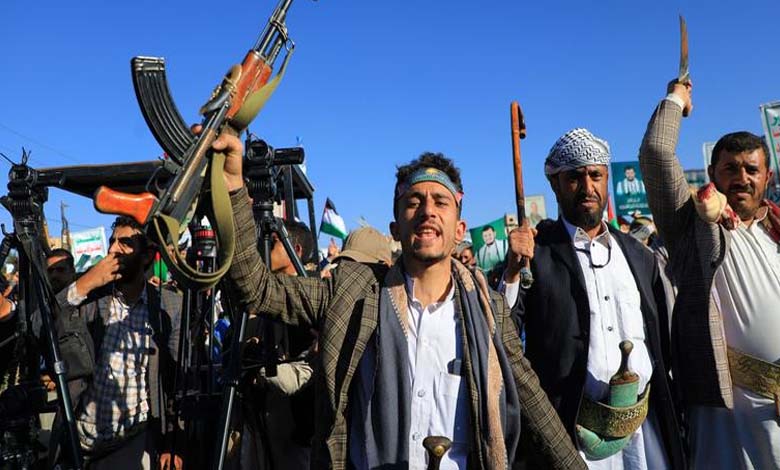The Houthis escalate hostility towards Israel as the West responds with harsh strikes: What’s the story?

In a dangerous escalation of regional tensions, Houthi leader Abdul-Malik al-Houthi has vowed more attacks on Israel using missiles and drones. Meanwhile, U.S. and British fighter jets carried out strategic strikes on key militia positions in Yemen’s Hodeidah province. These developments coincide with international efforts to curb Houthi threats to international shipping routes, amid calls for decisive action that could reshape the military and political balance in the region. This report explores the implications of these moves and their impact on the regional landscape.
-
The Houthis are preparing to leave Hodeidah… What are they doing?
-
UN Security Council Extends Sanctions on Houthis in Yemen: Details
Western strikes to curb Houthi escalation
In a show of determination to limit the Houthis‘ influence, U.S. and British forces conducted airstrikes on Thursday targeting critical sites in Hodeidah province, particularly in the Bajil district. These strikes are part of a series of air assaults aimed at weapon storage depots and command centers in Sanaa, Amran, and Al-Bayda to degrade their offensive capabilities.
Since January, the Western coalition has intensified attacks to counter Houthi threats to international navigation, particularly in the Red Sea and Bab al-Mandeb Strait. Reports indicate these actions have disrupted the Houthis‘ strategic plans to target commercial vessels and maritime infrastructure in the region.
-
A New Deal between the Houthis and Al-Qaeda… Details
-
What Are the Risks of Increasing Cooperation between the Houthis and Somalia’s al-Shabaab? Observers Respond
Houthis vow further aggression
Houthi leader Abdul-Malik al-Houthi confirmed in a speech broadcast by Al-Masirah that military operations against Israel using missiles and drones would continue, promising further escalation.
These remarks follow the announcement of a ceasefire between Israel and Hezbollah. Al-Houthi insists these attacks are part of supporting the Palestinian cause. He also stated that his forces would continue to collaborate with the “axis of resistance” led by Iran, adding, “We aim to conduct even greater actions against Israel.”
These threats are not new, as the militias have increased their attacks since the Gaza war erupted in October.
-
Due to the Brotherhood and the Houthis… Disasters and Tragedies on the Roads of Taiz
-
Report: Houthis Violate Childhood in Summer Camps and Hezbollah Interferes with School Curricula
Maritime targets
On the maritime front, reports reveal the Houthis have targeted over 200 ships since their recent escalation in the Red Sea and Gulf of Aden. These attacks, aimed at vessels they claim are linked to Israel, have caused a 12% disruption in global maritime trade.
The British Maritime Trade Operations have reported multiple incidents involving missiles, shells, and drones against commercial ships, prompting the Western coalition to bolster its military presence in the region.
-
The UN Exposes the “Opportunistic Alliance”: Collaboration between Houthis and Al-Qaeda in Yemen
-
Houthis Close Religious Centers That Disagree with Their Doctrine in Three Governorates
Iranian support for the Houthis
Houthi activities are directly backed by Iran, which sees them as a strategic tool to counter the U.S. and Israel. Experts believe the recent escalation sends a clear message from Tehran to Washington and Tel Aviv, especially as it coincides with diplomatic efforts to de-escalate tensions between Israel and Hezbollah.
Other sources suggest Iran is leveraging the Houthis to disrupt Israeli and U.S. interests in the region, focusing on navigation in the Red Sea and Bab al-Mandeb Strait as a critical pressure tactic.
-
Houthis and Humanitarian Organization Employees: Information in Exchange for Freedom
-
Houthis Committed Over 10,000 Violations of Yemeni Women’s Rights
Ongoing tactics to contain the Houthis
Military analyst James Winter notes that Western airstrikes aim to reduce the militias’ ability to deploy drones and ballistic missiles. He adds that continued strikes may force the Houthis to reconsider their strategy due to the significant losses they have recently incurred.
Meanwhile, political science professor Mohammed Al-Munji argues that while these airstrikes are tactically significant, they are insufficient for achieving long-term stability in the region.
-
Houthis Don’t Make Their Own Decisions… Iran Launches Attacks and Attributes Them to Houthis… A Senior Official Reveals the Truth
-
Growing concerns about the Houthis turning Yemen into a battleground for Iran’s wars… Details
Al-Munji asserts that these operations must be part of a broader strategy, including bolstering local forces opposed to the Houthis, such as the Southern Transitional Council, which controls strategic areas, and the Yemeni National Army, a key field force. Such support could help balance power by curtailing Houthi influence and reshaping Yemen’s political and military dynamics.
He also highlights the importance of regional cooperation with Gulf countries and enhanced coordination with Yemen’s legitimate government to secure maritime routes and weaken Iranian support for the Houthis, thereby exerting greater pressure on the group to change its course.
-
The Houthis’ Catastrophe Enters Its Second Decade: A Fireball Burning Yemen
-
Terrorism: A Product of the Muslim Brotherhood and the Houthis… Yemenis React to Major Massacres in the South












